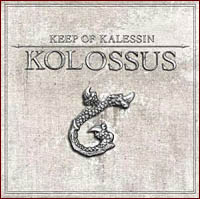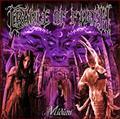KEEP OF KALESSIN (no) - Kolossus (2008)

Label : Indie Recordings / Season of Mist
Sortie du Scud : 6 juin 2008
Pays : Norvège
Genre : Black Metal
Type : Album
Playtime : 9 Titres - 54 Mins
KEEP OF KALESSIN. Malgré l’Armada qu’ils avaient sorti en 2006, je ne connaissais pas ce groupe avant de mettre dans mon lecteur le dernier en date, Kolossus. Je ne suis pas ce qu’on appelle un furieux de Black Metal, même si j’en écoute. Il y a certaines choses dans le style qui me freinent un peu à chaque fois. Je ne sais pas pourquoi alors mon choix s’est porté sur cet album, mais grand bien m’en a pris ! Déjà rien que pour l’introduction, « Origin », qui ne donne pas d’indications sur ce qu’on va prendre dans la tête par la suite. C’est plutôt une orientation folklorique tout en douceur et elle ne prépare en rien à « A New Empires’s Birth ». Ce morceau est bon, et permet d’introduire les éléments que l’on retrouvera ensuite pendant tout l’album : une double grosse caisse tétanisante, une batterie hyper active, une guitare à la fois agressive et envolée et un chant agressif mais pas urticant. Par contre, quand on arrive à « Against The gods », on entre dans une autre dimension. Le blast beat de Vyl est monstrueux. Je ne sais vraiment pas comment un batteur peut frapper aussi vite aussi longtemps. Moi qui ne suis pas un grand fan des blast beats de manière générale, j’ai été ensorcelé par le jeu précis et destructeur de Vyl. C’est simple, il ne déborde jamais et maintient le rythme d’une manière plus que martiale. Il a même l’outrecuidance de mettre quelques subtilités (coups de ride…) dans ce débordement de rapidité et de violence. Par contre, il est clair que vue la vitesse à laquelle il joue, il frappe moins fort et je trouve quand même que le blast beat donne moins de puissance que des rythmes plus lents mais plus frappés. Bref, j’ai vraiment aimé le jeu de Vyl et il est pour beaucoup dans mon appréciation du groupe. Mais il n’est pas le seul en cause. En effet, sans les fins de « Against The Gods » et « The Rising Sign », qui coupent les morceaux en deux et les font s’envoler dans de nouvelles dimensions, les choses n’auraient pas été pareilles. Pour le premier, c’est une fin rythmique chiadée et puissante, même si lente. Pour le second, on part vers quelque chose de calme et de très mélodique, envoûtant. « Warmonger » ne trouve pas vraiment sa place sur l’album selon moi, de part son côté beaucoup plus classique et « Rock ». Par contre, on retrouve dans « Kolossus » tout ce qui faisait les premiers morceaux, mélange de gros Black classique et de plages plus atmosphériques, même si elles sont soutenues par la guitare.
Kolossus est un album de Black qui plaira aux amateurs du genre, mais qui pourra aussi éveiller de nombreuses choses qui ceux qui n’en écoutent pas forcément habituellement. Il faut lui donner sa chance et savoir entrer dans cet univers sombre, mélancolique mais terriblement puissant et captivant.
Ajouté : Mardi 10 Juin 2008
Chroniqueur : Wong Li
Score :    
Lien en relation: Keep Of Kalessin Website
Hits: 11421
|














